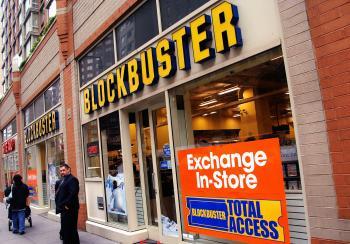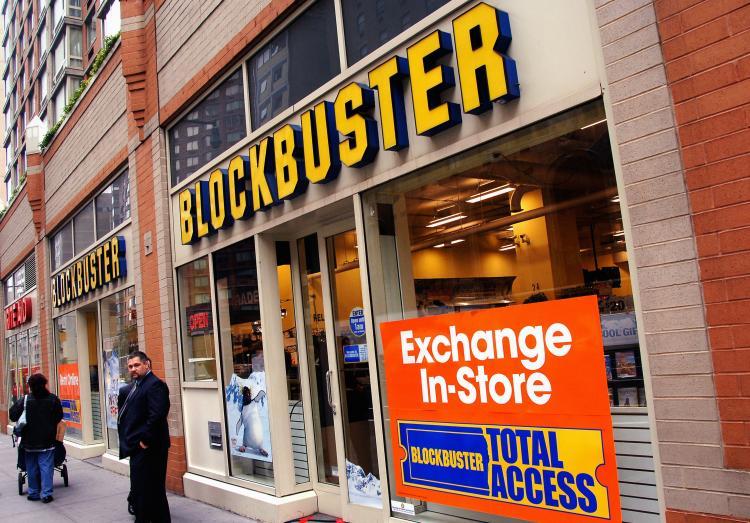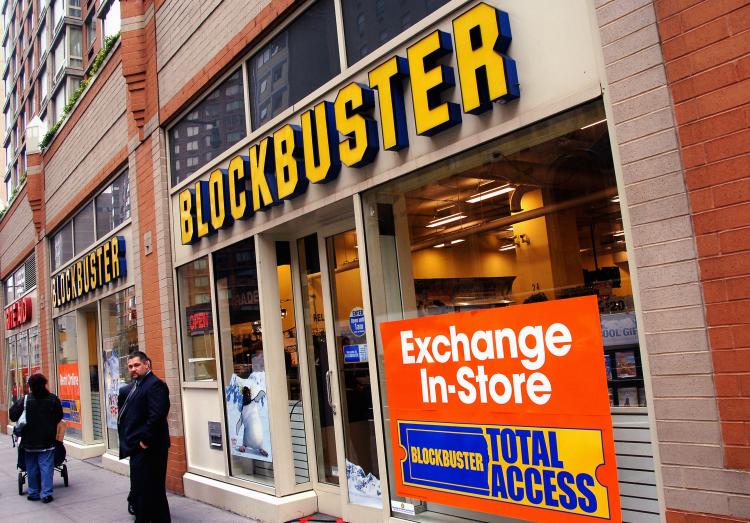In the same way video rental giant Blockbuster put many mom-and-pop video stores out of business two decades ago, it may be suffering the same fate at the hands of Internet technology and the advent of Netflix and Redbox.
Blockbuster Inc. is planning to file for pre-planned Chapter 11 bankruptcy protection as early as September, according to a Los Angeles Times report.
Citing people familiar with the matter, the report said that Blockbuster would close an additional 500 to 800 stores across the United States as it hopes to restructure its debt and stay in business, after losing more than $1 billion since fiscal year 2008.
The report said that Blockbuster executives met with six of the largest Hollywood film studios to brief them on the matter—support from studios is essential in any successful bankruptcy exit as Blockbuster must continue to receive new releases as well as exclusive titles to stay competitive and relevant.
In the pre-planned bankruptcy, Blockbuster would continue to pay most creditors as well as film studios, but it would allow the company to get out of certain store leases in underperforming locations and restructure certain debt to make payments more manageable.
For movie studios, it’s in their best interest to keep Blockbuster alive. The more competition in the marketplace for movies and DVDs, the higher licensing fees studios can charge for reproduction.
Blockbuster representatives could not be reached for comment.
Netflix is king
The arrival of online video streaming and mail order video rental such as the model operated by Netflix Inc. was Blockbuster’s undoing, experts say.
The irony is, around seven years ago, analysts were wondering about the feasibility of Netflix—then a Silicon Valley startup with an intriguing business model and a history of money-losing operations—in the face of industry stalwarts such as Blockbuster and Hollywood Video.
After it became apparent that mail order and online streaming were here to stay, Blockbuster’s competing Internet and mail services never took off.
And with new technological advancements in video-streaming and mobile TV, even Netflix’s mail order format may become obsolete in the not-too-distant future. Netflix recently signed a new five-year deal to stream movies online from Lionsgate, MGM, and Paramount Studios.
The Los Gatos, Calif.-based Netflix, led by Reed Hastings, made $1.6 billion in revenues and $115 million in profit last year.
The key difference between Blockbuster and Netflix is flexibility and cost structure. Netflix doesn’t have onerous store leases or the need to hire store managers and clerks, and due to its multiple shipping centers, it rarely runs out of popular titles. Its rental platform is mostly self-service, as customers log onto its website and select titles to rent.
“What happened is that Netflix and others have simply built a better mousetrap,” wrote Paul Dergarabedian, an analyst at Hollywood.com.
“In the same way that iTunes and file-sharing have killed the major record chains, technology is changing everything for movie rentals,” Dergarabedian says.
Blockbuster also faces competition from Redbox, an operator of self-serve kiosk video rental service available at many drugstores, malls, and department stores across the nation. Redbox, owned by Coinstar Inc., has experienced explosive growth—the company says that it has more than 22,000 locations.
In many locations, Redbox offers no-hassle overnight rentals for $1.
The traditional video rental chain also faces competition from pure online video streaming services such as Apple Inc.’s iTunes, Hulu, and YouTube. Apple charges a rental fee, while Hulu and YouTube’s services are free, but selection and titles are limited.






